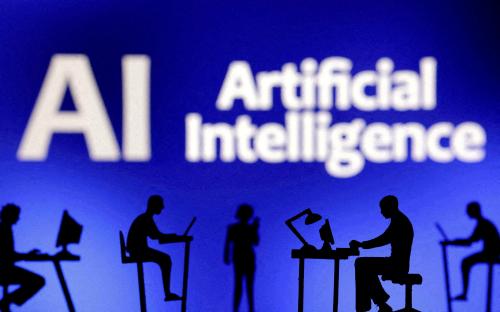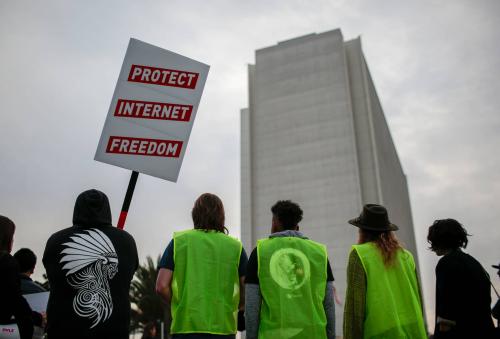Every week, the TechStream newsletter brings you the latest from Brookings’ TechStream and news and analysis about the world of technology. To sign up and get this newsletter delivered to you inbox, click here.
Widespread misinformation around the US election
With no immediate winner to be declared in the U.S. presidential election, the coming days and weeks will not only present a major test for American democracy, but also a significant challenge to the election officials and internet platforms struggling to contend with misinformation—including false claims by President Trump and his surrogates about rampant voter fraud.
The good news is that tech sector and government officials appear better prepared for misinformation than they were four years ago. Twitter, Facebook, and YouTube all rolled out at least some measures to label or remove patently false information about the election, and the impact of foreign influence operations appears to have been minimal.
The bad news is that the White House is now the biggest vector for creating and amplifying electoral misinformation. With vote counting still under way on Wednesday, Trump took to Twitter to baselessly claim that the election was being stolen. Although Trump’s premature declaration of victory and claims of voter fraud isn’t a surprise—he signaled he planned to do so well ahead of Election Day—his online supporters are likely to spread those claims widely online, setting up a major challenge for the platforms.
Electoral misinformation. Given President Trump’s claims about voter fraud, many of the false narratives about the election unsurprisingly centered on the ballot box. The Election Integrity Partnership, a research consortium, documented a wide array of claims: including voting machines malfunctioning; irregularities at polling stations; fake livestreams of election results; and suggestions about an expectation of violence at the polls or in the aftermath of the election.
Those narratives also appear to more pronounced within key swing states. An analysis by Zignal Labs, for instance, concluded that voters in Pennsylvania saw far more misinformation around allegations of voter fraud than other states. Likewise, in Florida thinly sourced claims that the U.S. Postal Service failed to deliver thousands of ballots in Florida rapidly gained momentum online, though there was little good evidence to back up the claim.
What went right. So far, the worst predictions about how online misinformation might play out around the election appear to have not come to pass. Twitter has applied labels to a wide range of posts claiming an early victory or baselessly alleging voter fraud—including several from Trump—and appears to have limited those posts circulation. Facebook applied similar labels to claims from Trump, but did not limit the ways users on the platform could interact with the post. Elsewhere on Facebook, after members of an anti-COVID-19 lockdown group on the platform mobilized to protest vote-counting, Facebook appears to have shut down the group.
Unlike in 2016, this year’s election has seen comparably little foreign interference in the election—at least so far. Iranian and Russian state-sponsored media have pushed material around U.S. division, but those efforts have gained relatively little traction, according to a mid-day update on Wednesday from the Election Integrity Partnership. U.S. officials told reporters that they did not see any significant cybersecurity issues on Election Day. Though few details are available, U.S. Cyber Command reportedly launched attacks against Russian and Iranian hackers to prevent election meddling.
A look ahead. The lack of a clear winner in the election is likely to provide particularly fertile ground for misinformation in coming days. Moreover, once all the votes are counted, if Trump is not the victor, he may double down on claims that the election was stolen. How tech platforms respond to those claims—and whether their new policies and enforcement mechanisms prove effective—could play a leading role in whether the American public accepts the legitimacy of the election.
Recently on TechStream
Watch: Ben Nimmo on influence operations and the Breakout Scale
In the study of influence operations, measuring the impact a given campaign has on a targeted individual’s behavior represents a major challenge. Users can’t be easily polled and the online reach of a campaign is a bad proxy for user behavior. In an interview with TechStream Managing Editor Elias Groll, Ben Nimmo, the director of investigations at Graphika, talks about how influence operations have evolved between 2016 and 2020 and how to measure their impact using the Breakout Scale, a new system developed by Nimmo to understand the impact of an information operation.
Will Americans trust a COVID-19 vaccine?
In the face of growing skepticism toward vaccines and proliferating anti-vaccination groups online, gaining public trust in a forthcoming vaccine for COVID-19 represents a major challenge in ensuring the success of such a treatment. Without trust in the efficacy of a vaccine, it is far less likely that society will reach herd immunity through vaccination. So how can politicians convince large swathes of the American public to take a vaccine once it becomes available? The answer may be counterintuitive, but simple: Keep mum, and let the scientists and public-health experts share the facts with the American people, Sarah Kreps and Douglas L. Kriner write.
What we’re following
Ant IPO. Ant Group, the Chinese financial platform, has been forced to postpone its highly anticipated IPO after founder Jack Ma was summoned to a meeting with Chinese financial regulators. The company’s public listing was expected to be the largest IPO in history, and its suspension represents a major setback for the Chinese tech and finance industries.
Eurocoin. The European Central Bank has opened a public consultation on the launch of a digital currency, an indication that the ECB might soon launch a cryptocurrency. The move comes as countries are increasingly exploring national cryptocurrencies. China is currently running trials for its digital currency and this week cleared $300 million in transactions using the technology.
Robocalls. The Federal Bureau of Investigation is investigating a widespread robocalling campaign that appears to have reached thousands of households on Election Day and urged individuals to stay at home. The origin of the calls have mystified industry experts, and amid fears of digital voter suppression efforts around the election, the far more low-tech robocalls are so far the most concrete example of nefarious actors trying suppress voter turnout.
Privacy law. California voters approved a ballot measure aimed at strengthening online privacy protections. Proposition 24 closes some loopholes in state law and establishes an independent agency for enforcing California privacy law.
Gig workers. Voters in California approved a ballot measure allowing gig economy companies like Uber and Lyft to classify their drivers as independent contractors instead of employees entitled to full benefits. The measure represents a major victory for gig economy companies and a major defeat for labor advocates.
Right to repair. Voters in Massachusetts approved a ballot initiative mandating carmakers share telematics with independent car dealers and repair shops. Access to that data has become increasingly important for mechanics in order to be able to repair newer, more computerized automobiles.
Spanish-language disinfo. With Vice President Joe Biden underperforming among Hispanic voters in South Florida, some observers are raising questions about whether disinformation targeting that community may have had an impact in swaying the Latino vote there toward Trump. Domestic Spanish-language disinformation remains a relatively understudied phenomenon in the United States, but a campaign targeting a U.S. ethnic minority should come as no surprise given how past campaigns have attempted to exploit racial and ethnic divisions in the United States.
QAnon in Congress. The QAnon conspiracy movement, which has gained enormous traction online and has seen interest spike in recent months, elected its first adherent to the U.S. House of Representatives. Marjorie Taylor Greene easily won the race to represent Georgia’s 14th congressional district, and her election represents a major milestone for the QAnon movement. Greene has expressed support for its theories, and her elevation to Congress is yet another step toward the mainstreaming of the conspiracy theory.
Arm/China. Nvidia’s $40 billion acquisition of the British chip-designer Arm may have hit an unexpected snag related to Arm’s Chinese subsidiary. The head of Arm’s Chinese venture, Allen Wu, controls 17% of the company’s shares and has fallen out with its owner, Japan’s SoftBank. The two parties appeared close to an agreement in September to buy out Wu, but those negotiations appear to have stalled and may imperil Nvidia’s acquisition of the company. The Nvidia/Arm tie-up would further consolidate the chipmaking industry at a time when the United States and China are jostling for control over the industry.
Huawei chip plant. Facing tightening U.S. restrictions on access to cutting-edge chips, Chinese telecom giant Huawei is reportedly weighing the construction of a new chip plant near Shanghai. That factory would supply chips to the company’s telecom business, but is several years from being operational and is unlikely to be able to fabricate cutting-edge chips.
Discord. To understand the future of the internet, Discord is not a bad place to start. Protocol’s David Pierce’s profile of the platform is not to be missed: “It’s built a space that feels unlike any other on the internet. It’s not quite group chat, it’s not quite forums, it’s not quite conference calling. It’s all of those things and none of them. It turns out, in that messy middle, is a place that mirrors what it’s like to be human, and interact with other humans, more closely than just about anything else on the internet.”
Reports we’re reading
Chinese surveillance. Researchers at ChinaFile pored over some 76,000 government procurement notices to understand where the Chinese surveillance state is headed.
Pandemic apps. Researcher Jonathan Albright has assembled a data-set of 493 apps with COVID-19 application.
A final point
“It is possible that watching hours of inconclusive election results deep into the night has poisoned your brain. It happens! Fortunately, that same vote-tallying vortex also offers an antidote: the gentle zen of the Philadelphia City Commissioners’ ballot-counting livestream.”
— Wired’s Brian Barrett on one of the few good things to be found on the internet on Election Day.
Google, Facebook, and Twitter provide financial support to the Brookings Institution, a nonprofit organization devoted to rigorous, independent, in-depth public policy research.



Commentary
The TechStream newsletter: Election Day misinformation
November 5, 2020